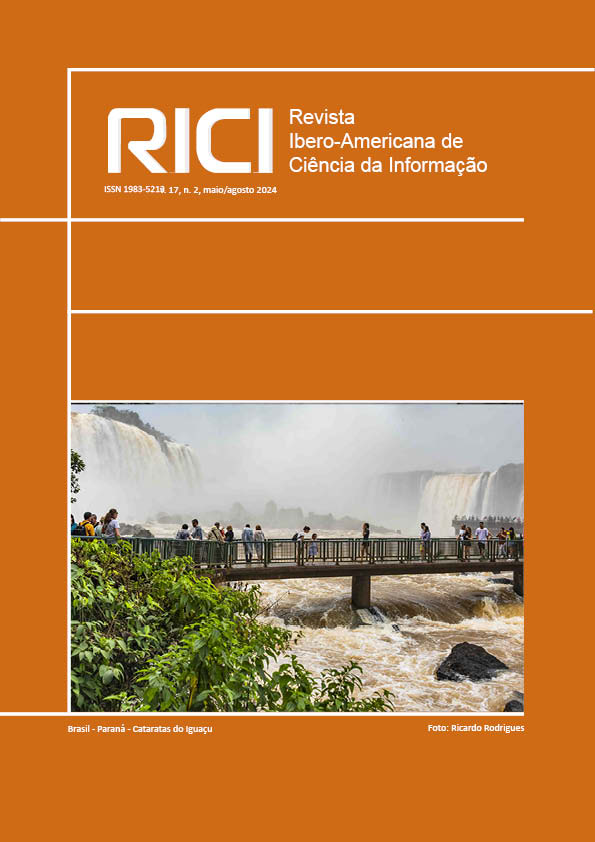Accessible digital academic publications produced by libraries in the academic environment for blind and low-vision students
DOI:
https://doi.org/10.26512/rici.v17.n2.2024.53859Keywords:
Academic libraries, Visually impaired, ccessible digital academic publishingAbstract
It considers that a Higher Education Institution is inclusive and accessible for visually impaired students when it carries out multidisciplinary communication in favor of their academic, scientific and social development in society. Related disciplines such as Information Science, Education and Technologies, whether Information or Assistive, emerge in this context as analogous, and contribute to the emergence of a new information profile that meets contemporary pluralities in the academic environment. This ongoing research aims to investigate how the production and dissemination of accessible digital academic publications in university libraries can contribute to the access, permanence and academic training of blind and low-vision students studying at the Federal University of Bahia. The methodological procedure was a descriptive, qualitative case study. The techniques used to collect data were interviews, direct observation and bibliographical research. The research shows that the exchange service for accessible digital academic publications that university libraries have been carrying out emphasizes their social role in promoting and disseminating information in the academic environment, collaborating with the educational and professional process of visually impaired students, but needs to be widely disseminated to the community it serves.
Downloads
References
Albagli, S. Conhecimento, inclusão social e desenvolvimento local. Inclusão Social, v., n. 2, p. 17-22, abr./set. 2006. https://revista.ibict.br/inclusao/article/view/1514
Amaral, R. M. do, Brito, A. G. C. de, Calabrez, A. P. A. Cooperação e intercâmbio em bibliotecas universitárias. In: CONGRESSO BRASILEIRO DE BIBLIOTECONOMIA, DOCUMENTO E CIÊNCIA DA INFORMAÇÃO, 25., 2013, Anais eletrônicos... 2013. http://repositorio.febab.org.br/files/original/8/2506/1618-1631-1-PB.pdf.
Botelho, M. C., Menezes, N. C. Acessibilidade nas bibliotecas da Universidade Federal da Bahia. Revista Informação na Sociedade Contemporânea, v. 6., n. 1, 2022. https://periodicos.ufrn.br/informacao/article/view/27519
Brasil. Decreto n° 9.522, de 8 de outubro de 2018. Promulga o Tratado de Marraqueche para Facilitar o Acesso a Obras Publicadas às Pessoas Cegas, com Deficiência Visual ou com Outras Dificuldades para Ter Acesso ao Texto Impresso, firmado em Marraqueche, em 27 de junho de 2013. Presidência da República, 2018a. https://www.planalto.gov.br/ccivil_03/_ato2015-2018/2018/decreto/d9522.htm.
Brasil. Lei nº 9.610, de 19 de fevereiro de 1998. Altera, atualiza e consolida a legislação sobre direitos autorais e dá outras providências. Presidência da República, 1998. https://www.planalto.gov.br/ccivil_03/leis/l9610.htm.
Brasil. Lei n° 13.146, de 6 de julho de 2015. Institui a Lei Brasileira de Inclusão da Pessoa com Deficiência (Estatuto da Pessoa com Deficiência). Presidência da República, 2015. http://www.planalto.gov.br/ccivil_03/_ato2015-2018/2015/lei/l13146.htm.
Cepêda, V. A. A sociologia do conhecimento em Karl Mannheim. In: Hayashi, M. C. P. I; Rigolin, C.C.D; Kerbauy, M. T. M. (Org.). A sociologia da ciência: contribuições ao campo CTS. São Paulo: Alínea, 2015. p. 59-89.
CAstells, M., Cardoso, G. (Org.). A sociedade em rede: do conhecimento à acção política. Imprensa Nacional – Casa da moeda, 2005. https://docplayer.com.br/1318616-A-sociedade-em-rede-do-conhecimento-a-accao-politica-organizado-por-manuel-castells-gustavo-cardoso.html
FORTALECIMENTO de bibliotecas acessíveis e inclusivas (Manual orientador). Mais Diferenças, 2016. 152 p. E-book. https://maisdiferencas.org.br/noticias-projeto/baixe-o-manual-orientador-para-fortalecimento-de-bibliotecas-acessiveis-e-inclusivas/.
Goméz, Maria Nélida G. de. Novas fronteiras tecnológicas das ações de informação: questões e abordagens. Ciência da Informação., Brasília, v. 33, n. 1, p. 55-67, jan./abril., 2004. https://revista.ibict.br/ciinf/article/view/1068
Malheiros, Tânia Milca; Cunha, Murilo Bastos da. As bibliotecas como facilitadoras no acesso à informação por usuários com deficiência visual. Revista Digital de Biblioteconomia e Ciência da Informação, v. 16, n. 1, p. 146-170, jan./abr., 2018. https://brapci.inf.br/index.php/res/download/114512.
Melo, F. R. L. V. de., Furtado, M. M. F. D., Malheiros, T. M. de C., Sousa, C. dos S. Rede Brasileira de Estudos e Conteúdos Adaptados (REBECA): desafios e perspectivas na colaboração do acesso à informação às pessoas com deficiência visual no Brasil. Revista Ibero-Americana De Ciência Da Informação, v. 15, n. 1, p. 254–265, 2022. https://periodicos.unb.br/index.php/RICI/article/view/42463
Nunes, M. S. C., Carvalho, K. de. As bibliotecas universitárias em perspectiva históricas: a caminho do desenvolvimento durável. Perspectivas em Ciência da Informação, v. 22, n. 1, p.173-193, jan./mar 2016. https://www.scielo.br/j/pci/a/LCcVhWXmMt6ydMmG6Gmmmzw/?format=pdf&lang=pt#:~:text=As%20bibliotecas%20universit%C3%A1rias%20s%C3%A3o%20institui%C3%A7%C3%B5es,com%20o%20intuito%20de%20agir.
Rosa, E. R. da, Dutra, M. C. Pessoas cegas: trabalho, história, educação e organização no Brasil. In: VII SEMINÁRIO NACIONAL DE ESTUDOS E PESQUISAS “HISTÓRIA, SOCIEDADE E EDUCAÇÃO NO BRASIL. jul. 2006. https://histedbrantigo.fe.unicamp.br/acer_histedbr/seminario/seminario7/TRABALHOS/E/Enio%20rodrigues%20da%20rosa.pdf.
Saracevic, T. Ciência da Informação: origem, evolução e relações. Perspectivas em Ciência da Informação, v. 1, n. 1, p. 41-62, jan./jun. 1996. https://www.brapci.inf.br/_repositorio/2017/07/pdf_7810a51cca_0000015436.pdf.
Varela, A. Informação e construção da cidadania. Brasília: Thesaurus, 2007. 167 p.
Downloads
Published
How to Cite
Issue
Section
License
Copyright (c) 2024 Nelijane Campos Menezes, Sérgio Franklin Ribeiro da Silva

This work is licensed under a Creative Commons Attribution 4.0 International License.
Copyright Notice
Authors who publish in this journal agree to the following terms:
- Authors retain copyright and grant the journal right of first publication with the work simultaneously licensed under the Creative Commons Attribution License 4.0, allowing the sharing of work and recognition of the work of authorship and initial publication in this journal.
- Authors are able to take on additional contracts separately, non-exclusive distribution of the version of the paper published in this journal (ex.: distribute to an institutional repository or publish as a book), with an acknowledgment of its initial publication in this journal.
- Authors are permitted and encouraged to distribute their work online (eg.: in institutional repositories or on their website) at any point before or during the editorial process, as it can lead to productive exchanges, as well as increase the impact and citation the published work.
















